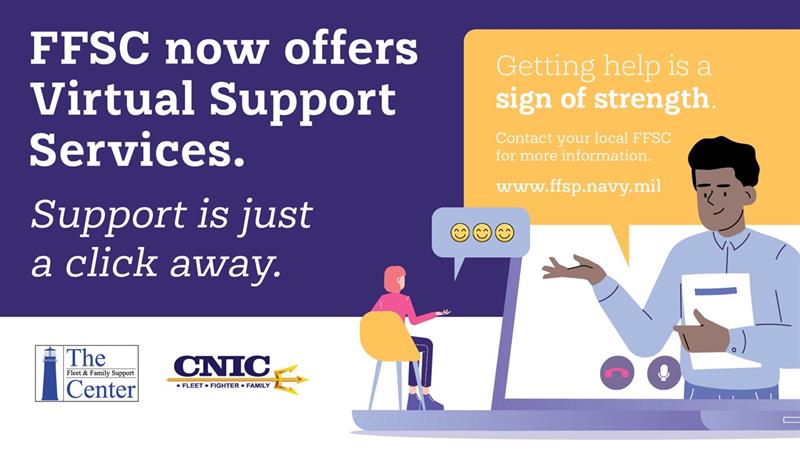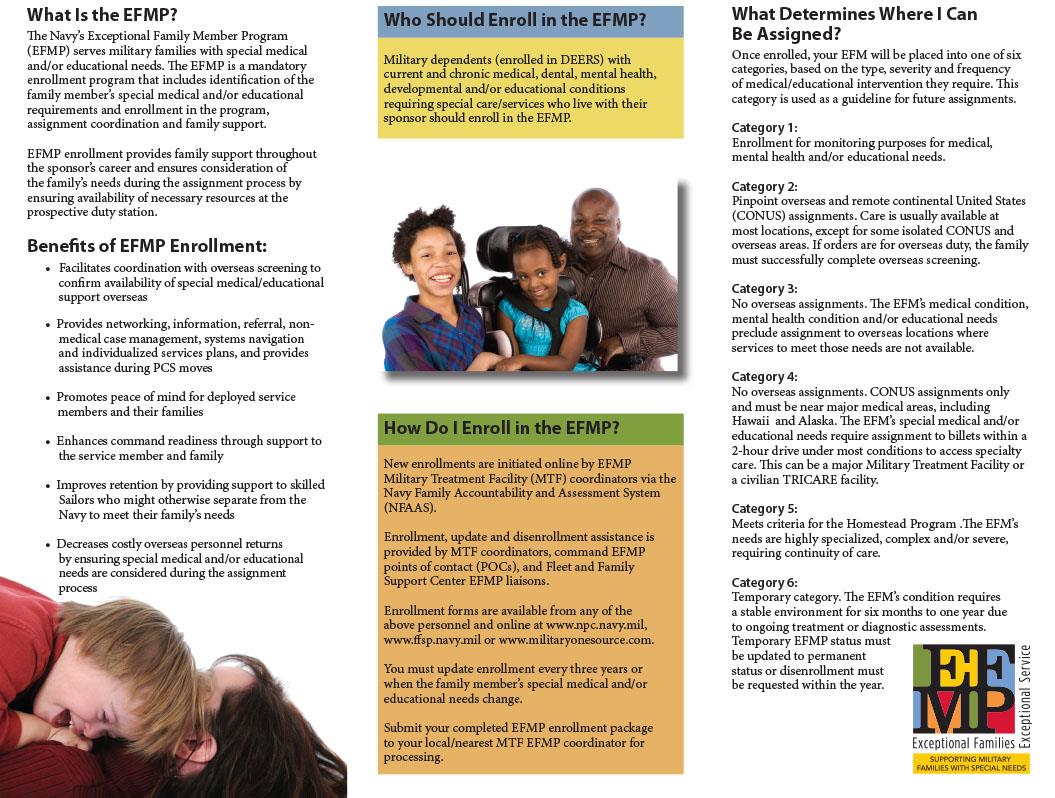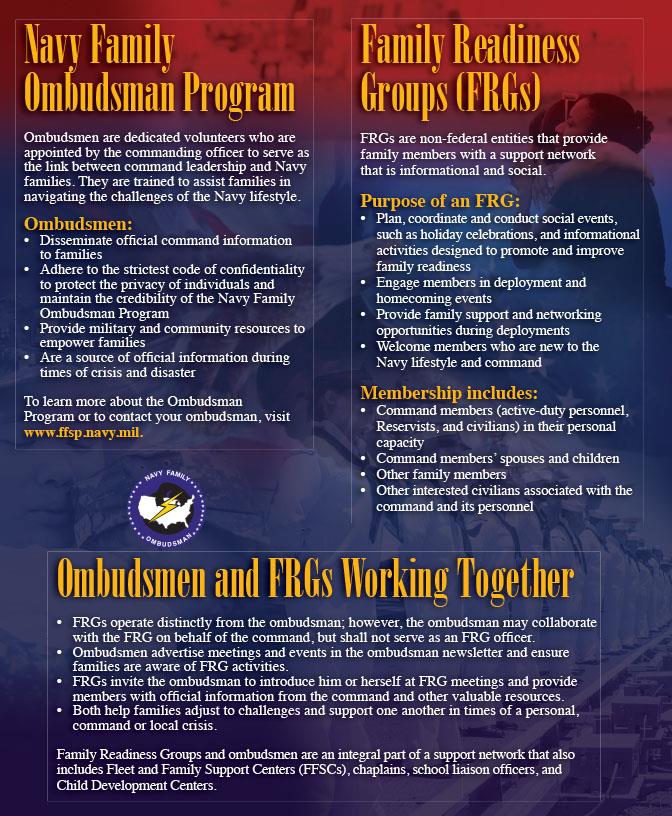Fleet & Family Support Center Dahlgren
Events
Fleet and Family Support staff recognizes that being military is a lifestyle that presents unique challenges and opportunities for service members and their families. Our Programs intend to help make the most of military life. Workshops and seminars are open to active duty and retired military personnel, their family members, and if space is available, Department of Defense employees, their spouses, and contract employees. The programs are organized and facilitated by the professional staff of the Fleet Family Support Center as well as professional educators within the local community.
FFSC Virtual Workshops
More Services Offered:
Clinical Counseling
Licensed credentialed clinical professionals, such as social workers and marriage/family therapists, provide confidential services to active duty service members and their families. Some of the highlights of this program include:
- Individual, marriage, family and group counseling
- Short-term, solution-focused non-medical treatment
- Counseling goals generated with the client(s) and clinician
- Assist in dealing with concerns such as situational difficulties, stress-related military lifestyle, understanding communication differences and techniques to assist, educational programs and prevention programs
Family Emergency Response
Disaster affects hundreds of thousands of people every year. It may happen at your local Navy installation. It may happen to you. Family Emergency Response is the quick response provided to commands, personnel, and families when they are faced with crises such as natural or manmade disasters, loss of life, disaster evacuation, or war. In the midst or aftermath of an incident, FFSC team members strive to provide the following based on the event:
- Setting up a 24-hour Emergency Family Assistance Center, if needed
- Staffing the Assistance Center with Fleet & Family Support staff and other agency staff, as needed
- Consultation
- Crisis intervention
- Debriefings
- Information and referrals
- Work towards restoring mission readiness
Are you and your family ready for an emergency?
Whether you’re part of the general Navy community, the Navy’s emergency management team, or a potential partner in disaster response and recovery, you have a role in planning for emergencies -- preparedness is your duty.
Please explore Ready Navy to find information and tools to help you and your family prepare for emergencies that could arise any time without warning.
Navy Family Accountability and Assessment System
Navy Family Accountability and Assessment System standardizes a method for the Navy to account, manage, and monitor the recovery process for personnel and their families affected and/or scattered by a wide-spread catastrophic event. NFAAS provides valuable information to all levels of the Navy chain of command, allowing commanders to make strategic decisions that facilitate a return to stability.
NFAAS allows Navy Personnel to do the following:
- Report Accounting Status
- Update Contact/Location information
- View Reference Information
- Complete a Needs Assessment Survey
Deployment Readiness
Deployment Readiness assists military members and their families with deployment-related issues and responds to patron and command identified needs. Programs include:
- Command consultation and support
- Information and Referral
- Individual Augmentee Deployment Support
- Ombudsman Support
- Exceptional Family Member Referral Information
- Life Skills Education Programs
Exceptional Family Member Program
The Navy's Exceptional Family Member Program launched a new mobile application that provides Navy families, doctors, service providers, detailers, and program administrators up-to-date information and resources all in one place.
To access the EFMP app, go to the Navy App Locker at https://www.applocker.navy.mil/#!/apps. Sailors and family members can use the EFMP app directly from there, or the app can be downloaded to an Android or Apple phone, a computer, or various other mobile devices.
The Exceptional Family Member Program provides an all-inclusive approach for the community, educational, medical, housing, and personnel services for families with special needs. Enrollment is mandatory for all service members who have family members with special needs. Enrollment ensures the maximum provision of services to the family throughout the service member’s career. Special needs include special medical, dental, mental health, developmental, or educational requirements; the requirement for adaptive equipment assistive technology devices; or services of a wheelchair.
Exceptional Family Member Program liaisons assist families in locating special needs services and resources by identifying local military and civilian resources such as special education assistance, social and support groups, treatment providers, and information about local disability services. Respite care helps military families with children with special needs by providing 40 hours of respite care per month so they can leave the house, go to an appointment, shop, or just rest while knowing that their child is well cared for.
Benefits to service members, families, and command leadership include:
- Networking, information, referral and resources, and assistance during a permanent change of station moves
- Peace of mind for deployed service members and their families
- Enhances command readiness through support to the service member and family
- Improves retention by providing support to Sailors who may otherwise consider separation to best meet their family’s needs
- Decreases costly overseas returns by proactively ensuring that duty assignments are made with special needs taken into consideration
Family Advocacy Program
The Family Advocacy Program provides a variety of intervention and treatment models to meet the needs of individual families in reference to child and spouse/partner abuse concerns. Licensed credentialed clinical professionals provide the services. Domestic Abuse Victim Advocates also play a key role in assisting with these services. The program is designed to address the prevention, identification, reporting, intervention, treatment, and follow-up of child and spouse/partner maltreatment. The program has five primary goals:
- Prevention of family violence
- Victim safety planning and protection
- Offender accountability
- Rehabilitative education and counseling
- Community accountability and responsibility for a consistent, appropriate response
New Parent Support Program
Would you like to connect with other expectant or new moms and dads? Are there questions you have about the birthing process or parenting a newborn? If so, join us for the New Parent Support group. Services include parenting/family/infant home visitation programs, breastfeeding instruction/support, parent and toddler/baby playgroups, infant care, parenting classes, and breast pumps loan program. The program also provides and supports four lactation stations at various sites on base for the exclusive use of nursing mothers who are returning to work.
Ombudsman
Navy ombudsmen are key resources for family members, particularly during deployments. They serve as a liaison between the command team and families within the command. Ombudsmen:
- Provide information and referral to assist families with concerns or issues.
- Regularly communicate and distribute information to and from the command and the unit’s family members.
- Keep the command informed regarding the overall health, morale, and welfare of the families in the command.
Personal Financial Management Counseling
A financial education staff provides financial education, training and counseling that emphasize long-term financial responsibility through instruction on sound money management, debt management, saving, investing and retirement planning.
The educator is available by appointment to provide individual financial counseling and help with basic financial needs.
Relocation Assistance
Service members and their families live a mobile lifestyle. Moving is stressful, even for the most experienced mover. Let the Relocation Assistance staff help make your move as smooth as possible. Relocation Assistance offers many programs for relocation including:
- Smooth Move
- Moving with Children
- Moving with exceptional family members
- Moving Overseas
- Sponsor Training
- New Spouse Orientation
- Loan Locker
Sexual Assault Prevention and Response Program
The Sexual Assault Prevention and Response (SAPR) Program’s primary goals are to prevent sexual assault from happening in our community and to support victims when an assault is reported. The SAPR program services are confidential and available 24/7. Here are some frequently asked questions regarding sexual assault and the SAPR program.
What is Sexual Assault?
Sexual assault is defined as intentional sexual contact characterized by force, threats, intimidation or abuse of authority or when the victim does not or cannot consent. It includes rape, forced sodomy (oral or anal sex), touching of a sexualized nature and attempts to commit these crimes.
What should I do if I’m the victim of a sexual assault?
If you or someone you know is the victim of a sexual assault, it’s important for you to know the reporting options and where to turn for help. By contacting the SAPR 24/7 Victim Advocate duty phone, you can speak confidentially with a victim advocate and learn about reporting options and available resources.
What if I’m not sure what happened is sexual assault?
You are more than welcome to contact SAPR Victim Advocates or the Sexual Assault Response Coordinator (SARC) for assistance.
Who can access SAPR services?
Active duty members, Military dependents 18 years old and older, 2nd referrals to Civilian services are available to DoD Civilians.
What is the difference between a restricted and unrestricted report?
- Restricted - Allows victims to confidentially disclose the assault to specified individuals. The victim can receive medical treatment, including emergency care, victim advocacy & support, counseling and Victim Legal Counsel (VLC) legal consultation. Restricted reports are a good option for victims who want to access services, but don’t want to participate in a criminal investigation or have their command notified of their report.
- Unrestricted - Victims choosing an unrestricted report have access to the full SAPR services; including victim advocacy & support, medical care, counseling and Victim Legal Services (VLC). With an unrestricted report, the victim’s Commanding Officer and law enforcement will be notified of the report, potentially leading to a criminal investigation. Because the victim’s Commanding Officer is aware of the report, the victim has access to additional services such as an expedited transfer and military protective orders. An unrestricted report is a good option for victims seeking an expedited transfer or is in need of other supportive measures from their command. It’s also a good option for victims seeking a criminal investigation.
Who are the specified individuals I can contact for a restricted report?
SAPR Victim Advocates, SARCs and medical providers (including counselors) are the only people who can take restricted reports.
Are there other people I can tell and still make a restricted report?
There are three additional people you can tell about your sexual assault and still be eligible for a restricted report. They are: chaplains, VLCs and a friend.
-
Chaplains are a great resource for victims of sexual assault who are seeking spiritual support. They have absolute privilege which prevents them from disclosing information about the assault to the SAPR program. Therefore, they are unable to take a restricted report, but are a confidential resource for victims.
-
Like chaplains, VLCs are available to victims of sexual assault and do not inform the SAPR program of victim reports. Victims can learn about the legal process and discuss their options with an attorney and maintain confidentiality.
-
Victims can now tell a friend, who is not in their direct chain of command, about the assault and still have the option for a restricted report, as long as that friend keeps the information confidential.
If I make a restricted report, can I change it to an Unrestricted?
Yes, you can. Restricted reporting documents and evidence (when applicable) are secured for 50 years. Victims can change their mind at any time and reach out to the SARC to change their restricted report to an unrestricted report.
Can I change an unrestricted report to restricted?
Unfortunately, once a case is unrestricted, it cannot be changed to a restricted report because the required notifications have already taken place. However, victims of sexual assault can change their mind about participating in the criminal investigation.
Who are/What are Victim Advocates (VA)?
Victim Advocates are carefully selected, trained and credentialed military and DoD civilian personnel who provide support and assistance to victims of sexual assault. They are directly supervised by the SARC and are required to maintain confidentiality of victim communication. At our installation, there is a watch bill staffed by SAPR VAs, providing 24/7 access to the SAPR program. You can reach out to a SAPR VA within your command or call the 24/7 hotline.
If you are interested in learning more about the SAPR program, or need assistance, please feel free to contact us.
24/7 Hotline: 540-424-0660
Civilian Victim Advocate: 540-376-8858
SARC: 202-672-4686
DOD SAFE Helpline: 877-995-5247
Transition Assistance
The Transition Assistance Program helps better prepare service members transitioning out of the military into the civilian world. The program coordinates the Transition GPS (Goals, Plans, Success) workshop. The transition staff facilitate capstones as well an array of other career focused classes. The program is open to military members who are separating or retiring as well as spouses.
Volunteer Services
Navy programs and services often need the help of volunteers to be successful. There are numerous volunteer opportunities at the Fleet and Family Support Center at Dahlgren or in the local community. Please contact the Volunteer Coordinator for volunteer opportunities on base.
New to the Navy App
The New to the Navy mobile application is for Sailors (Enlisted and Officers) who are fresh out of Boot Camp or Officer Candidate School and ready to report to their first command. The app answers common questions new Sailors may have on pay and personnel matters as they transfer to a school or to their duty station. Available for Apple and Android devices.
 arrow down
arrow down


















